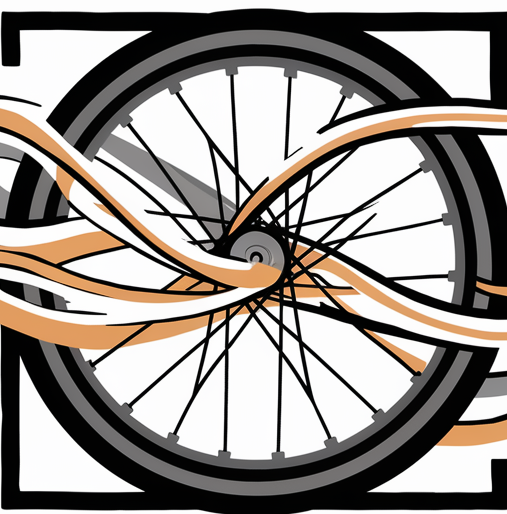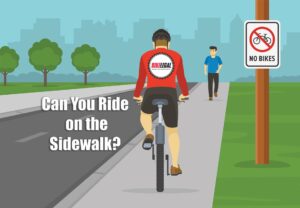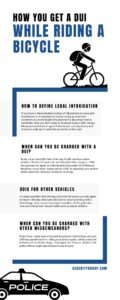Yes, you can get a DUI on a bicycle. Many people are unaware of this fact.
Bicycles are considered vehicles in many states. This means that the laws for driving under the influence (DUI) apply to cyclists too. Riding a bike while intoxicated can be dangerous. It poses risks to you and others on the road.
Understanding these laws is important. It helps keep everyone safe. This blog will explore how DUI laws apply to cyclists. We will also discuss the consequences of getting a DUI on a bicycle. Stay with us to learn more about this important topic.
Bicycles And Dui Laws
Bicycles can lead to DUI charges similar to cars. Many states consider cycling while intoxicated illegal. Legal consequences vary, but safety is crucial.
Cycling is a great way to explore your city, stay fit, and reduce your carbon footprint. But did you know that riding a bicycle while under the influence of alcohol can land you in legal trouble? Many people are unaware that DUI laws can apply to bicycles in certain situations. This raises an intriguing question: can you really get a DUI on a bicycle?State Variations
DUI laws differ across states, and this includes how they apply to bicycles. In some states, bicycles are considered vehicles under DUI laws. Therefore, the same rules that apply to cars can also apply to bicycles. In California, for instance, riding a bicycle under the influence can lead to a fine. Meanwhile, in states like Colorado, riding a bike drunk is treated less severely than driving a car under the influence. It’s essential to know the specific laws in your state to avoid unexpected penalties.Legal Definitions
Understanding what constitutes a DUI on a bicycle requires knowing the legal definition of “vehicle” in your state. Some states define a vehicle broadly, including bicycles under this category. This means any road transport rules can apply to cyclists as well. Other states may not categorize bicycles as vehicles, leading to different legal consequences. However, regardless of legal definitions, riding a bike while impaired can still be dangerous. You risk harming yourself and others, and facing consequences beyond legal fines. So, before hopping on your bike after a few drinks, consider the laws in your area. Reflect on whether it’s worth the risk to your safety and others. Wouldn’t it be better to call a cab or a friend for a lift?
Credit: votewithyourfeetchicago.blogspot.com
Alcohol Impact On Cycling
Riding a bicycle after consuming alcohol might seem harmless, but it’s important to understand the impact alcohol has on your ability to cycle safely. The combination of alcohol and cycling can be dangerous for both the rider and others sharing the road. Cycling under the influence not only increases the risk of accidents but also could potentially lead to a DUI charge in certain jurisdictions.
Physical Impairment
Alcohol affects your physical abilities significantly, even on a bicycle. It reduces coordination, balance, and reaction time. These factors are crucial for safe cycling.
Imagine trying to steer your bike through a crowded street. Alcohol can make it feel like you’re riding on a slippery slope. Your reflexes slow down, making it hard to dodge sudden obstacles or react to traffic changes.
Have you ever felt dizzy after a few drinks? Now, picture that sensation while you’re trying to maintain your balance on two wheels. The risk of falling or swerving into traffic increases dramatically.
Decision Making
Alcohol clouds your judgment. You might think you’re cycling like a pro, but in reality, your decision-making skills are impaired. This can lead to poor choices like ignoring traffic signals or taking risky shortcuts.
Consider the last time you made a hasty decision after a drink. On a bike, these impulsive decisions can have immediate consequences. Running a red light on a bicycle is just as dangerous as in a car.
Ask yourself: Is it worth risking your safety and potentially facing legal consequences for a night of fun? Making responsible choices keeps you and others safe on the road.
Have you ever experienced or witnessed the effects of cycling under the influence? Sharing your story might help others understand the risks involved. Always prioritize safety, for yourself and those around you.
Legal Consequences Of Cycling Dui
Cycling under the influence can lead to legal trouble in many regions. Laws often treat it similarly to driving a car while intoxicated. Penalties might include fines, license suspension, or mandatory programs, depending on local regulations.
Riding a bicycle under the influence of alcohol or drugs might seem harmless compared to driving a car. However, the legal consequences of a cycling DUI can be surprisingly severe. Many jurisdictions view cycling DUI as a serious offense. If you think you can avoid legal trouble while cycling intoxicated, you might want to think again.Fines And Penalties
Cycling DUI often results in hefty fines. These fines vary depending on the state or country, but they can be quite substantial. You could face penalties similar to those for a motor vehicle DUI. Imagine being caught on your bike after a night out and suddenly having to pay hundreds of dollars. Even if you’re not operating a motor vehicle, the law can still hit you hard. Some areas impose community service or mandatory alcohol education classes. Would you really want to spend your weekends doing community service because of a cycling mishap?License Suspension
A cycling DUI can affect your driving privileges too. Some jurisdictions may suspend your driver’s license, even if you weren’t driving a car. How would you feel if a night of biking cost you your license for months? This can impact your daily life significantly. Getting to work, running errands, or going on road trips might suddenly become difficult. It’s a harsh reality that many don’t consider when deciding to ride a bike after drinking. Think about how a license suspension might affect your insurance rates. It’s not just about losing your license; it’s about the ripple effect it could have on your life. Would you want to risk it over a few drinks?Comparing Bicycle And Vehicle Dui
Riding a bicycle under the influence can result in DUI charges in many areas. Laws vary between bicycles and vehicles. Understanding local regulations is crucial to avoid penalties.
Navigating the legal landscape of DUI charges can be confusing, especially when it comes to bicycles. Many people are surprised to learn that you can receive a DUI while biking. This raises the question: How do bicycle DUIs compare to vehicle DUIs? By understanding the differences and similarities, you can better comprehend the potential consequences and make informed choices.Severity Of Charges
The severity of DUI charges on a bicycle versus a vehicle can vary widely. In most jurisdictions, vehicle DUI offenses are considered more serious due to the increased potential for harm and accidents. Bicycles, while still capable of causing accidents, generally pose less risk to public safety. This often results in lighter penalties compared to vehicle DUIs. However, don’t underestimate the impact of a bicycle DUI—some states treat it almost as seriously as vehicular offenses. The fines can still be hefty, and you might face jail time depending on the circumstances. Imagine receiving a DUI while cycling home from a casual night out. It’s a situation many don’t anticipate, yet it could still lead to significant financial strain.Impact On Record
A DUI conviction, whether on a bike or in a car, can tarnish your record. Vehicle DUI convictions often have a more severe impact, affecting your driving privileges and insurance rates. Bicycle DUIs may not directly affect your driver’s license, but the conviction can still appear on your criminal record. This can be a shock for someone who thought biking was a safer, smarter choice after drinking. Employers or landlords might see this when conducting background checks. Could this affect your job prospects or housing applications? It’s a possibility worth considering. Keep in mind that a clear record is essential for various aspects of life, and even a bicycle DUI can cast a long shadow. Being aware of the consequences can guide your decisions. Would you risk your future over a night of fun? It’s a thought-provoking question that might change your perspective on drinking and biking.Safety Concerns For Impaired Cyclists
Cycling offers freedom and fun. Riding impaired can transform joy into danger. Bicycling under the influence poses serious safety risks. Both the cyclist and others face potential harm. Understanding these risks is crucial for everyone’s safety.
Risk To Self
Impaired cyclists face increased risk of accidents. Alcohol and drugs slow reaction times. They impair judgment and coordination. Even a small mistake can lead to a fall or crash. Injuries from such accidents can be severe. Cyclists lack the protection that cars provide. Helmets help, but they aren’t foolproof. Riding impaired makes them less effective.
Risk To Others
Impaired cyclists also endanger pedestrians and other road users. Swerving or losing control can cause collisions. Such accidents may injure others, even if the cyclist remains safe. Children, the elderly, and pets are especially vulnerable. Cyclists must remain alert to protect everyone on the road. Impairment hinders this responsibility, increasing risk for all.
Alternatives To Cycling Under Influence
Riding a bicycle while drunk can lead to legal trouble. Consider walking, public transport, or carpooling instead. These options are safer and can prevent accidents and fines.
Cycling is a fantastic way to stay fit and reduce your carbon footprint. However, when you’ve had a few drinks, hopping on your bike might not be the best idea. Riding under the influence can lead to accidents and legal issues, much like driving a car. Fortunately, there are safer alternatives to consider when you’ve been drinking. ###Public Transportation
Public transportation is a reliable and cost-effective option for reaching your destination safely. Buses and trains run frequently in most urban areas, making them a convenient choice. Imagine this: after a fun night out with friends, you realize biking home isn’t the safest option. Instead, you hop on the nearest bus and enjoy a worry-free ride home. The next day, you’re grateful for making a smart decision. Some cities even offer late-night services to accommodate revelers. Check the schedule in advance and save the local transit app on your phone for quick access. ###Designated Riders
Designated riders aren’t just for cars. You can apply the same principle to cycling. If you’re planning a night out, why not have a friend who stays sober and can safely bike you home? Think back to college days when you and your friends took turns being the designated driver. The same concept can apply to biking. It’s a simple way to ensure everyone gets home safely. You might wonder, “What if I’m riding solo?” Consider teaming up with a local cycling group. Many have members willing to assist others, ensuring safe travels after a night out. It’s a great way to foster community spirit and make new friends. Choosing not to cycle under the influence is a decision you’ll never regret. It ensures your safety and that of others around you. So next time, skip the risky ride and opt for a smarter, safer alternative.Real-life Cases Of Bicycle Dui
While many think DUI laws apply only to cars, bicycles are included too. Real-life cases show the serious consequences of riding a bike under the influence. These incidents highlight the dangers and legal repercussions of cycling while impaired. Let’s explore some notable incidents and their legal outcomes.
Notable Incidents
In New York, a cyclist collided with a pedestrian. He was found to be over the legal alcohol limit. The pedestrian suffered minor injuries. This incident raised awareness about bicycle DUIs in urban areas.
In California, a man was arrested after swerving on a busy road. He was riding his bike while heavily intoxicated. His reckless behavior endangered both himself and others. Local news reported the event, sparking public debate.
Legal Outcomes
The New York cyclist faced charges similar to those in a car DUI. He received a fine and mandatory alcohol counseling. His license was also suspended, affecting his ability to drive.
In California, the cyclist’s legal outcome was severe. He spent time in jail and paid hefty fines. The court also imposed community service. These legal consequences highlight the seriousness of bicycle DUIs.
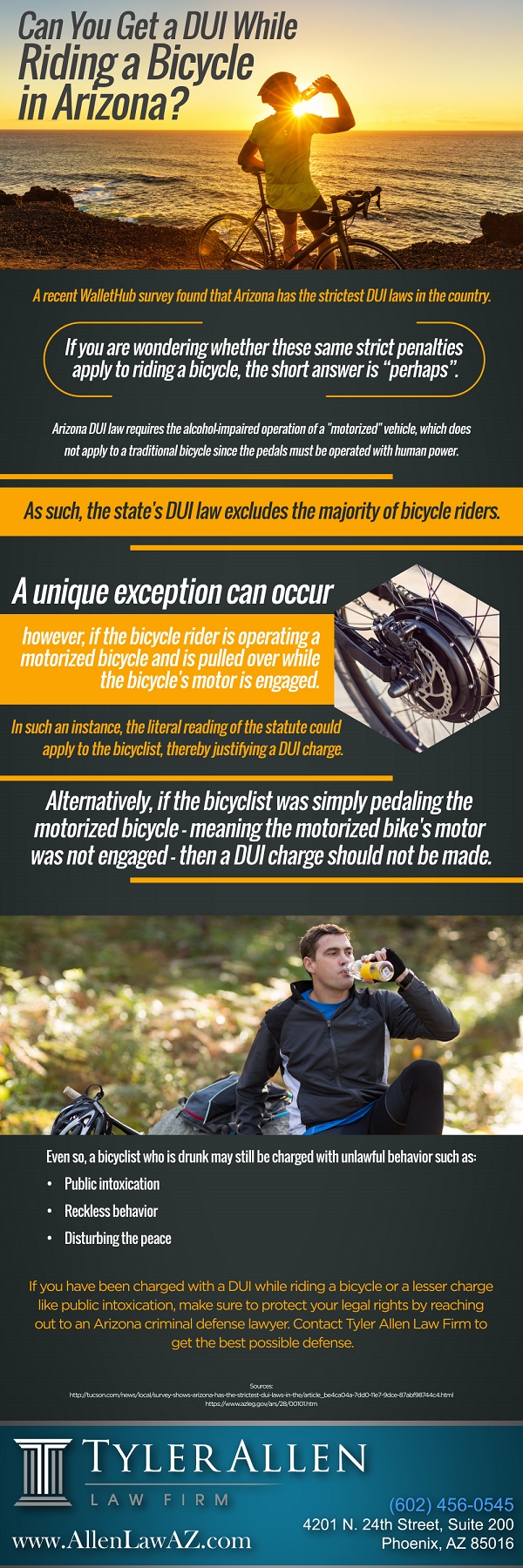
Credit: www.allenlawaz.com
Preventive Measures And Education
Preventing DUIs on bicycles is as essential as it is for motor vehicles. Education and awareness are the cornerstones of reducing these incidents. By empowering cyclists with knowledge and resources, we can foster safer communities.
Community Programs
Community programs play a pivotal role in educating cyclists about the risks of biking under the influence. Imagine attending a local workshop where experienced cyclists share real-life stories about their encounters with impaired biking. These programs often offer hands-on sessions, teaching you practical skills like maintaining balance and understanding traffic laws.
Your community might already have a cycling club or group that organizes safe biking events. Joining such groups can provide both education and a sense of camaraderie. What better way to learn than by being part of a community that values safety?
Awareness Campaigns
Awareness campaigns are another effective strategy in the fight against DUIs on bicycles. These campaigns often utilize eye-catching posters, social media, and local events to spread crucial messages. Picture yourself walking past a vibrant poster that illustrates the consequences of biking under the influence. It’s hard to ignore.
Some campaigns go a step further by engaging with schools and universities. Imagine students participating in interactive sessions where they learn about the importance of sober biking. Could these early interventions change the future of cycling safety?
By participating in or supporting these programs and campaigns, you’re not only protecting yourself but also contributing to a culture of safety and responsibility. What steps can you take to be a part of this change?
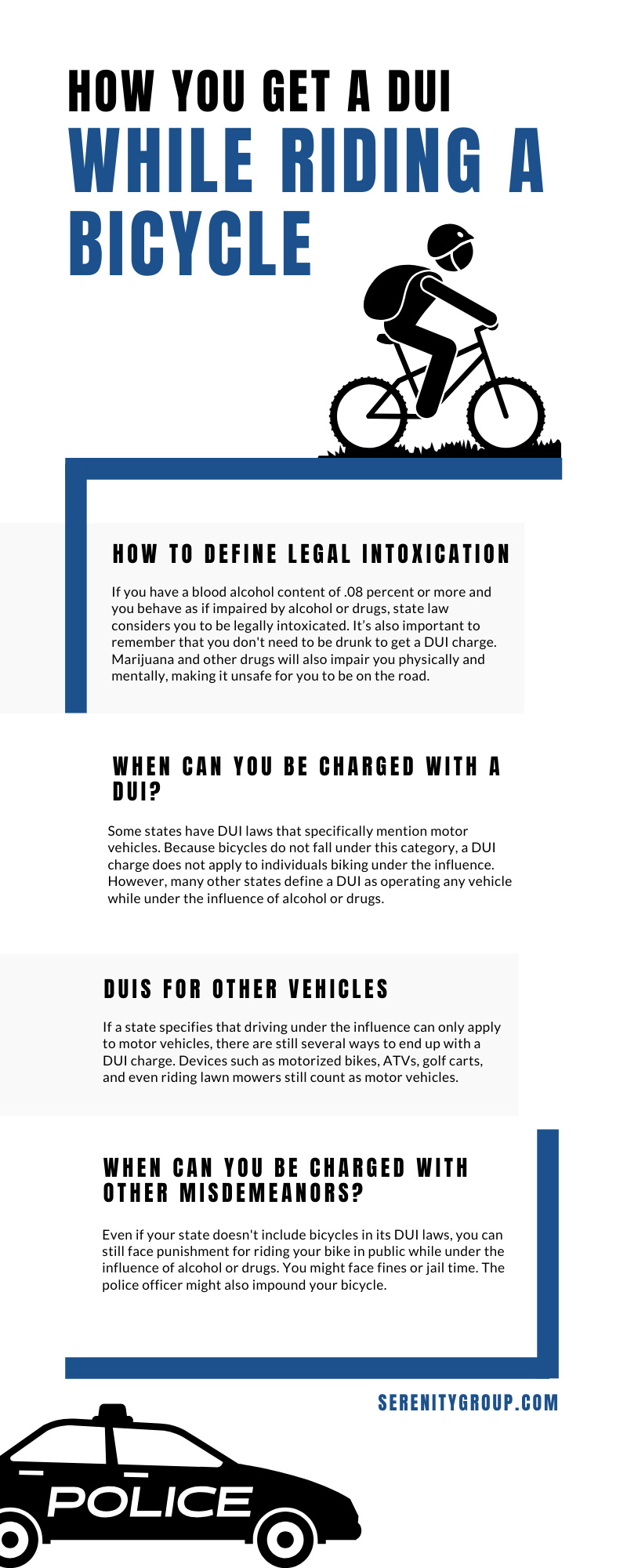
Credit: serenitygroup.com
Frequently Asked Questions
In What State Can You Get A Dui On A Bicycle?
You can get a DUI on a bicycle in many states, including California, Florida, and Oregon. Each state has specific laws. Always check local regulations.
What Is A Dui On A Bicycle Called?
A DUI on a bicycle is commonly called “cycling under the influence” or “BUI” (biking under the influence).
What Are The Penalties For Dui On A Bicycle?
Cycling under the influence can lead to fines, license suspension, or community service. Penalties vary by jurisdiction, affecting cyclists like motorists. Legal consequences might include mandatory safety courses or probation. Consult local laws for precise details, as regulations differ widely.
Can You Drink While Cycling?
Yes, you can drink while cycling, but it’s important to stay hydrated with water or sports drinks. Avoid alcohol.
Conclusion
Riding a bicycle while intoxicated is still illegal. It can result in a DUI charge. Laws vary by state, but safety should always come first. Alcohol impairs judgment and balance, even on two wheels. Avoid drinking and biking to stay safe and legal.
Understand local laws to protect yourself and others. Biking is a fun and healthy activity, but it should be done responsibly. Making informed choices keeps everyone safe. Remember, a DUI can happen on a bike. Stay aware, stay sober, and enjoy your ride responsibly.
